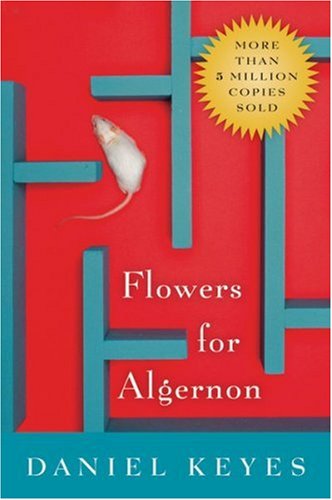Flowers for Algernon
Author: Daniel Keyes
Release Date: 1959
Pages: 311
Review by: Cassia
Charlie has never been...the brightest being on earth. With an IQ of 68 and a big heart, he is taken advantage of by everyone, teased, and exiled by his own family. When the opportunity arises for him to have an operation that will increase his intelligence, he is eager to do it, despite the risks. As his intelligence increases, he remembers things about his childhood he never knew, learns about that world around him, and his morals become compromised, especially when he finds out that he’s been a laughing stock of society.
One thing I really liked about this book was the way it was written. Keyes has a style that I can only describe as intelligent. When you first pick up the book, you’ll think I’m crazy, but just go with it. Actually, the way he writes it in the beginning, with everything spelled wrong, is brilliant. Keep in mind, the book is written from Charlie’s point of view, so at the beginning, when he has an IQ of 68, that’s how he writes, that’s how he talks. It really gives the reader perspective, and I enjoyed it, though after I was done reading that part I thought I was the one spelling everything wrong. Throughout the book, I was drawn in by the author’s style. It’s different than anything I’ve read--first person, inside the mind of a man who is slowly going insane.
The plot is also unique from anything I’ve ever read. It’s fictional, of course, but think about it: an operation to increase your intelligence. It’s crazy! Even if you’re not a science fiction person, it’s intriguing. Also, keep in mind that this book was written in the 1960s. Even so, the way Keyes presents it, it still seems probable today. The plot was a bit slow, but I was okay with it. Usually I like a book that’s fast-paced, an on-the-edge-of-my-seat kind of thing, but for this book, I favored the slower pace. The book itself is very contemplative, and that just doesn’t work with a fast plot. It allowed Charlie to explore his own mind; and I loved seeing inside Charlie’s mind, what he thought, how he felt, and it was interesting. Even though the plot isn’t much as far as action goes, Keyes keeps you busy.
On to the characters! First we have the protagonist, Charlie. It’s hard for me to say whether I like him or not, because he’s kind of all over the place. However, I must say, I like the dumb Charlie a lot better. He’s so simple-minded, and he just loves people and wants to do the right thing. As his intelligence increases, though, he starts to figure out what people have been doing to him his whole life, and he gets on the defensive about everything. He becomes a selfish jerk. He wants to have relationships with people, but he just keeps hurting people. Part of the reason is that his knowledge outgrows his emotional maturity, and he can’t deal with it. Also, there are doctors and psychologists there to help him, but for some reason we never see them really helping him adjust. That annoyed me. Maybe they did help him, but from Charlie’s breakdown at the convention, it sure looks like they didn’t. I wish I would’ve had more information on that topic. Especially near the end, Charlie’s got some serious problems that are unresolved. Oh, and he ends up writing a piano concerto. That made me happy. :) I feel sorry for Charlie, and he is certainly a very interesting character, but I can’t say that I like him. These characters aren’t the next most-important out of them all, but those doctors I was talking about, their names are Nemur and Strauss. I liked Strauss, he actually tried to help, but Nemur, the head of the experiment, is a total jerk. ‘Nuff said. Next is Alice, a.k.a. Miss Kinnian. I liked her, but she was very indecisive. She is very smart, but I felt like she was doing this the whole time:
But I don’t blame her. Part of that is that she didn’t know what she wanted, and whether it was the right decision or not. She provides an outlet of sorts for Charlie throughout the experiment, and she helps him quite a lot, physically and emotionally. There’s also Charlie’s family, and I’m not particularly fond of them. His mother is a wack-job, his sister is just confused, and though his father had the decency to save him from his mother, he abandoned him as well. Oh, I almost forgot about Fay! When Charlie gets his own apartment, Fay lives across the hall. I like her, though I don’t agree with some of the things she does. She’s an artist, loves to dance, loves people, trusts everyone (to the point of never locking her door), and has no modesty or sense of privacy whatsoever. Also, she’s good for Charlie. He needs someone who doesn’t know about the experiment, and someone who helps him forget about his past and live in and for the moment. Especially with Fay, there are some mature scenes and themes in this book, and also some mature scenes from Charlie’s memories.
Keyes creates a unique book with intriguing characters and plot, exhibits themes of acceptance, mental illness, and love, and explores the depths of the mind with brilliant writing.





No comments:
Post a Comment